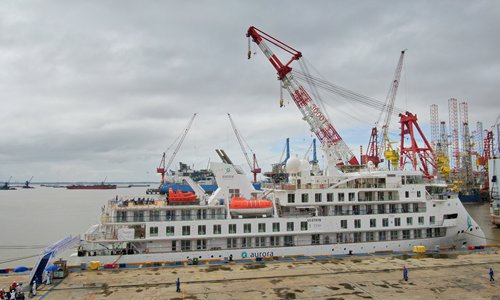HOME >> SOURCE
Chinese shipping operators beef up efforts to adapt to IMO 2020: expert
Source:Global Times Published: 2019/12/30 22:45:10

The first China-made polar cruise liner parks at a port in Haimen, East China's Jiangsu Province, on August 6. It was handed over to US US vessels management company Sunstone Ships on that day. Photo: VCG
As a tougher regulation on sulfur emissions from ships, known as IMO 2020, comes into effect from Wednesday, Chinese shipping operators are beefing up efforts to adapt to new rules regarding bunker fuel, mainly by using required fuels and by installing scrubbers, an industry representative said.
The sulfur content of bunker fuel should not exceed 0.50 percent from Wednesday globally, compared with 3.50 percent through the end of December, according to the rule announced by the International Maritime Organization (IMO), a UN shipping agency.
Fuel oil with a sulfur cap of 0.50 percent is set for international onboard sea-going vessels in Chinese waters on Wednesday, and it should not exceed 0.10 percent when operating in the inland river emission control area, according to a document released by the Maritime Safety Administration.
"Due to the fact that China mandated bunker fuels with a maximum of 0.50 percent sulfur content in the Domestic Emission Control Areas from January 1, 2019, problems exposed were effectively solved, such as fuel supply and supervision," said Peng Chuansheng, deputy chief engineer of the China Waterborne Transport Research Institute.
Peng told the Global Times that China has achieved general recognition by international society for bunker fuel switching, and it will significantly reduce sulfur emissions as well as protect blue skies.
Peng said that in the short term, low-sulfur fuel oil is $260 more expensive than high-sulfur fuel oil per ton in the world market. The price fluctuates according to market demand, even though oil giants can produce the fuels that meet the requirement.
Apart from fuel switching, exhaust gas cleaning systems, known as scrubbers, are a significant solution for compliance with IMO 2020 initially for the Chinese and global shipping industry. This alleviates the pressure on 0.50 percent sulfur bunker fuels, according to S&P Global Platts, a provider of energy and commodities information.
Peng reckons that about 4,000 ships will be fitted with scrubbers by January 2020 among almost 60,000 ships globally, adding that scrubber equipment is costly, ranging from $2 million to $10 million per ship.
Meanwhile, many industry experts think liquefied natural gas (LNG) bunker is another way for shipping operators to comply with IMO 2020. However, Peng said that while LNG bunker is almost sulfur-free, it can emit more NOx, also known as an atmospheric pollutant, in the context of immature LNG engine technology, compared with low-sulfur fuel oil.
Peng added that China seriously lacks LNG filling facilities.
Posted in: INDUSTRIES,MARKETS